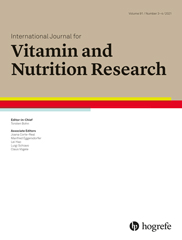Riboflavin deficiency alters cholesterol homeostasis partly by reducing apolipoprotein B100 synthesis in HepG2 cells
Abstract
Abstract. Riboflavin deficiency led to lower blood cholesterol level and higher content of hepatic cholesterol in rats and the mechanisms are not clarified yet. We hypothesized that riboflavin deficiency might alter cholesterol homeostasis via apolipoprotein B100, one of the important proteins in cholesterol transport. To test this hypothesis, HepG2 cells were cultured in riboflavin-deficient media for 4 days to develop riboflavin deficiency. Compared to riboflavin-sufficient cells, the mRNA (0. 37 ± 0.04 vs 1.03 ± 0.29 relative expression level, n = 3) and protein expressions of apolipoprotein B100 (intracellular: 173.7 ± 14.4 vs 254.8 ± 47.2 μg/mg protein; extracellular: 93.8 ± 31.1 vs 161.6 ± 23.9 μg/mg protein; n = 3) were significantly reduced in riboflavin-deficient cells (P < 0.05). Endoplasmic reticulum oxidoreductin 1 and protein disulfide isomerase, two enzymes involved in the oxidative folding of apolipoprotein B100, were also lower remarkably in expression at both mRNA and protein levels. Meanwhile, intracellular cholesterol was increased (256.3 ± 17.1 μM/g protein vs 181.4 ± 23.9 μM/g protein, n = 4) and extracellular cholesterol decreased (110.0 ± 23.2 μM/g protein vs 166.2 ± 34.6 μM/g protein, n = 4) significantly in riboflavin-deficient cells (P < 0.05). Very low-density lipoprotein was also diminished (29.0 ± 6.1 μM/g protein vs 67.0 ± 11.0 μM/g protein, n = 4) in the culture media (P < 0.05). These findings suggest that riboflavin deficiency alters cholesterol homeostasis partly by reducing apolipoprotein B100 synthesis in HepG2 cells.
References
1 (2018) Riboflavin in human health: A review of current evidences. Adv Food Nutr Res. 83, 57–81.
2 (2000) Riboflavin as a determinant of plasma total homocysteine effect modification by the methylenetetrahydrofolate reductase C677T polymorphism. Clin Chem. 46, 1065–1071.
3 (2002) Riboflavin, flavin mononucleotide, and flavin adenine dinucleotide in human plasma and erythrocytes at baseline and after low-dose riboflavin supplementation. Clin Chem. 48, 1571–1577.
4 (2015) Evaluation of riboflavin intakes and status of 20–64-year- old adults in South Korea. Nutrients. 7, 253–264.
5 (2013) Mapping low intake of micronutrients across Europe. Br J Nutr. 110, 1–19.
6 (1987) Effects of moderate riboflavin deficiency on lipid metabolism in rats. Proc Natl Sci Counc Repub China B. 11, 128–132.
7 (2000) Biochemical basis of oxidative protein folding in the endoplasmic reticulum. Science. 290, 1571–1574.
8 (2002) Sulfhydryl oxidases: emerging catalysts of protein disulfide bond formation in eukaryotes. Arch Biochem Biophys. 405, 1–12.
9 (2018) Endoplasmic reticulum stress signalling – from basic mechanisms to clinical applications. FEBS J. https://doi.org/10.1111/febs.14608.
10 (1986) Apolipoprotein B synthesis by human liver and intestine in vitro. Proc Natl Acad Sci USA. 83, 5296–5300.
11 (1986) Complete protein sequence and identification of structural domains of human apolipoprotein B. Nature. 323, 734–738.
12 (2005) Riboflavin deficiency impairs oxidative folding and secretion of apolipoprotein B-100 in HepG2 cells, triggering stress response systems. J Nutr. 135, 978–82.
13 (2017) Riboflavin deficiency induces a significant change in proteomic profiles in HepG2 cells. Sci Rep. 7, 45861.
14 (2005) HepG2 cells develop signs of riboflavin deficiency within 4 days of culture in riboflavin-deficient medium. J Nutr Biochem. 16, 617–24.
15 (1995) Intrauterine vitamin B2 uptake of preterm and full-term infants. Pediatr Res. 38, 585–591.
16 (2016) Effects of riboflavin on antioxidant function in HepG2 cells. Acta Nutr Sin. 38, 381–385.
17 (1996) Pharmacokinetics and utilization of orally and intravenously administered riboflavin in healthy humans. Am J Clin Nutr. 63, 54–66.
18 (2014) Riboflavin (vitamin B2) and oxidative stress: A review. Br J Nutr. 111, 1985–91.
19 (2012) Oxidative stress, thiols, and redox profiles. Methods Mol Biol. 889, 325–346.
20 (2013) Ero1-PDI interactions, the response to redox flux and the implications for disulfide bond formation in the mammalian endoplasmic reticulum. Philos Trans R Soc Lond B Biol Sci. 368, 20110403.
21 (2001) Gadd153 sensitizes cells to endoplasmic reticulum stress by down-regulating Bcl2 and perturbing the cellular redox state. Mol Cell Biol. 21, 1249–59.
22 (1999) Signal transduction from the endoplasmic reticulum to the cell nucleus. Physiol Rev. 79, 683–697.
23 (1998) Identification of the cis-acting endoplasmic reticulum stress response element responsible for transcriptional induction of mammalian glucose-regulated proteins. J Biol Chem. 273, 33741–33749.
24 (2017) Recent insights into PERK-dependent signaling from the stressed endoplasmic reticulum. F1000 Res. 6, 1897.
25 (2014) Endoplasmic reticulum stress impairs cholesterol efflux and synthesis in hepatic cells. J Lipid Res. 55, 94–103.


